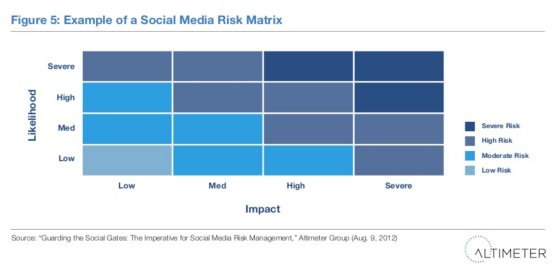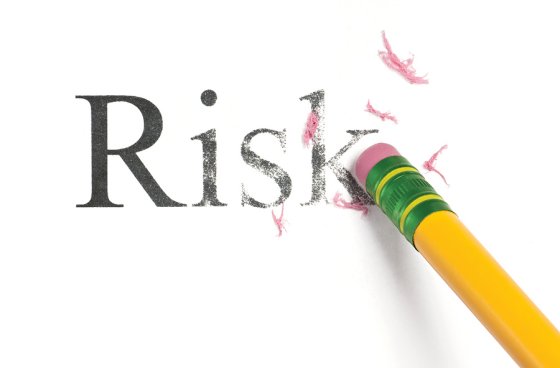I’m so tired of research firms releasing leading studies just to raise their industry profile. I’ve seen it done with organizations I like and respect such as Forrester, IDC (see “Social Media Research is Full of Leading Questions”), Facebook (“The Report that 85% of Facebook Users Are Creating Content is a BS Statistic”), and now Altimeter Group. It’s the latest foray into alarmist research in a report entitled, “Guarding the Social Gates: The Imperative for Social Media Risk Management” which is the result of their “2012 Altimeter Social Media Risk Management Survey.”
In the report, Altimeter defined risk as “The likelihood that a negative social media event will happen (multiplied by) The impact that negative event will have if it does happen.” The report does neither:
- They don’t calculate the “likelihood” that a negative social media event will happen. They asked, “How risky do you currently consider the following social media channels to your organization?” That’s an opinion of actual risk, which is actually “fear.”
- They don’t calculate the “impact” of the negative event. The closest they get is show the reader what a risk assessment would look like. It’s a laughably simplistic chart (see below). And they also ask a “Yes/No” question, “Does your company currently assess its social media risk?” That question should have been the qualifying question to even take this study.

By Altimeter’s own admission risk is an equation, and yet they don’t calculate anything. This study on “risk” negates the real analysis of risk performed by actuaries, financiers, and many others.
This study is NOT a calculation of risk. This study is a calculation of fear.
To defend their stance that social media is “risky,” Altimeter pulled out single well-known public examples of companies being damaged with regard to IP, brand, and other supposedly risk-prone areas of business.
This study shows that given communications can no longer be controlled, companies are afraid of others’ ability to freely communicate in a public sphere. And of course that communications could be damaging if someone posted your intellectual property or said how much they hated your brand or product. We all knew that before this study was every conducted.
This study does not provide any insight into where risk lies and how damaging it is. Instead, it tells the reader that these well known social media experts working for big brands named in this study are afraid of these things. Are you afraid like they are? Well maybe you should be.
Here are the questions that should have been asked:
- Where do you fear loss in your company?
- What are the prized jewels you’re trying to protect?
- If someone actually damaged those prized jewels in social media, what would that cost your company?
- Have you currently had any loss due to social media? If so, what was it and how much did it cost you in damage control, brand rebuilding, legal fees, and employee time?
Given that we don’t have many examples of social media loss, and the fear expressed in this study is so high, we should see a huge discrepancy between question 1 and 4. If true, that would mean that fear of social media loss greatly supersedes actual loss from social media. But if Altimeter Group released that study, no one would be rushing to them for business. Alarmist research causes the phone to ring.
This was one of the many stories I harped about on this week’s edition of “The Beancast” with Bob Knorpp (@BobKnorpp). On the show with me were:
- Bill Green (@mtlb), Chief of Strategy, Noble Mouse
- Hal Thomas (@halthomas), Content Manager, BFG Communications

Listen to the entire show below or download it.
Audio clip: Adobe Flash Player (version 9 or above) is required to play this audio clip. Download the latest version here. You also need to have JavaScript enabled in your browser.
NOTE: This was actually a tough post to write because I’m actually friendly with many members of the Altimeter Group and completely respect their work. This is not intended to be an attack on their brand and the quality of their client work, but rather a discussion on the issue of how social media can negatively affect many aspects of our business, and how businesses can prepare and mitigate those potential damages.
Stock photo of Risk being erased courtesy of Big Stock Photo.




